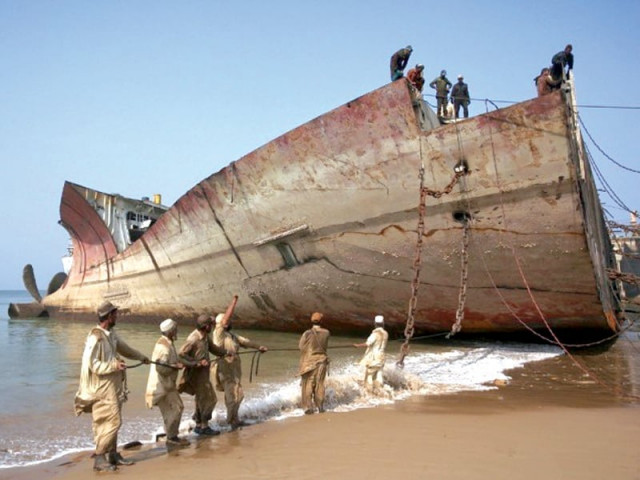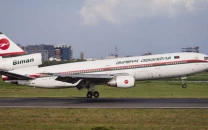Gadani ship breaking: a glimpse into the abyss
Labourers languish in one of the country’s most hazardous industries.

At Gadani the entire scrapping process is manual. The workers bear the brunt as ship breaking entails carrying heavy sheets and metal chunks. PHOTO: FILE
Life at Gadani is not an easy one. At the world’s third largest ship breaking yard, the work of dismantling a ship for steel and iron and scrapping the trash is done by Pakistan’s most desperate laborers, who earn a meager amount in return and are provided only rudimentary benefits. As some ship-breaking labourers put it, it is a gruelling and dangerous pursuit.
The atrocious accidents that occurred a few days ago leave one in a state of despair. In a ship breaking yard most of the accidents that take place are a result of toxic gas explosions and heavy steel metals. At Gaddani the entire scrapping process is manual. The workers bear the brunt as ship-breaking entails carrying heavy sheets and metal chunks. In many cases the weight they carry far exceeds what is allowed by the Factories Act. Numerous workers have also lost their lives either by being struck by falling objects or by hazardous substances including asbestos fibres.
The workers in the ship-breaking industry of Pakistan are usually illiterate, very poor and hence not aware about their safety and the dire repercussions of poisonous chemicals. Many workers are also not imparted any training on the dismantling process and most of them remain oblivious of the hazards they are exposed to.
Another issue is that there is no formal employment contract between the employer and the employee. Workers are not given an appointment letter and so there is no aspect of permanency in their jobs. Children are the main victims of such injustices. Not only are they denied their rights but they are also threatened if they raise their voice or challenge the status quo.

In spite of signing and ratifying the Basel Convention in June 1994 and the Rotterdam Convention in 2005, the ship-breaking industry in Pakistan continues to be a source of human causalities. These conventions require that parties strictly protect human health and environment against the adverse effects which may result from the generation and management of hazardous wastes. The Gadani incident is a clear indication of the poor implementation of these international law commitments.
Therefore it is vital to address the issue of ship-breaking in Pakistan and its negative impact on the health and environment. It is important to not only adhere to the international commitments regarding ship-breaking but also adhere to international guidelines set out by the International Finance Corporation (IFC). The issues at Gadani can be only resolved if the state does away with providing financial assistance to operations that are in contravention of the Basel Convention, such as operations involving ships with extensive asbestos.
It is crucial for Pakistan to also look at International Labour Organisation (ILO) guidelines to ensure that safety standards are met when employing labour in the ship breaking industry. The country must work towards introducing a policy in line with ILO guidelines that includes the control of the import and preparation of ships for breaking, rights of the workers in the ship breaking industry and ensuring proper working conditions at the ship breaking site. All laws and regulations in Pakistan must reflect the information provided on ship breaking by International Labour Organisation (ILO), the International Maritime Organisation (IMO) and the Basel Convention.
Moreover, the laws have to specify that the employer of a ship breaking facility has a responsibility for the protection of the workers with regard to their health and safety. Workers must be trained about their personal safety to control any risk. Workers must be given the right to report any accident or injury to health which arises in the course of their work. The employers must be willing at all times to cooperate with the employees.
As the National Union Federation Secretary says “The ship breaking industry has become a goldmine for investors but it is nothing but a death trap for workers”. It is important to realise that the availability of relatively inexpensive labor should not allow this industry to blithely compromise on workers’ safety. Gadani needs to learn to value human life.
The writer is a lawyer and a researcher based in Pakistan and holds a law degree from the University of London.
Published in The Express Tribune, July 29th, 2013.
Like Business on Facebook, follow @TribuneBiz on Twitter to stay informed and join in the conversation.



















COMMENTS
Comments are moderated and generally will be posted if they are on-topic and not abusive.
For more information, please see our Comments FAQ